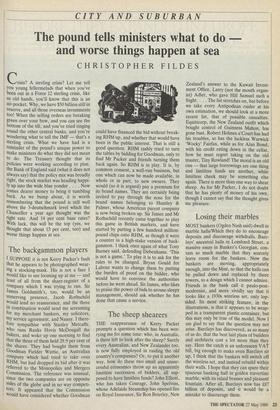The backgammon players
I SUPPOSE it is not Kerry Packer's fault that he appears to be photographed wear- ing a stocking-mask. His is not a face I would like to see looming up at me — and least of all from the share-register of a Company which I was trying to run. Sir James Goldsmith's, too, would be an unnerving presence, Jacob Rothschild would lend no reassurance, and the three in combination would send me screaming for my merchant bankers, my solicitors, my service agreement, and Nanny. I there- fore sympathise with Stanley Metcalfe, who runs Ranks Hovis McDougall the bakers, and woke up one morning to find that the three of them held 29.9 per cent of the shares. They had bought them from Goodman Fielder Wattie, an Australian Company which had tried to take over RHM, but had dropped its bid after it was referred to the Monopolies and Mergers Commission. The reference was unusual, since the two companies are on opposite sides of the globe and in no way competi- tors. It appeared that the Commission would have considered whether Goodman could have financed the bid without break- ing RHM up, and whether that would have been in the public interest. That is still a good question. RHM rashly tried to turn the tables by bidding for Goodman, only to find Mr Packer and friends turning them back again. So RHM is in play. It is, by common consent, a well-run business, but one which can now be made available, in whole or in part, to new owners. They would (so it is argued) pay a premium for its brand names. They are certainly being invited to pay through the nose for the brand names belonging to Huntley & Palmer, whose American parent company is now being broken up. Sir James and Mr Rothschild recently came together to play this game in British markets, and have started by putting a few hundred million- pound chips onto RHM, as though it were a counter in a high-stake version of back- gammon. I think once again of what Tony Burney said, defending Debenhams. 'This is not a game.' To play it is to ask for the rules to be changed. Bryan Gould for Labour wants to change them by putting the burden of proof on the bidder, who would have to convince the authorities before he went ahead. Sir James, who likes to praise the power of bids to arouse sleepy management, should ask whether he has done that cause a service.


















































 Previous page
Previous page